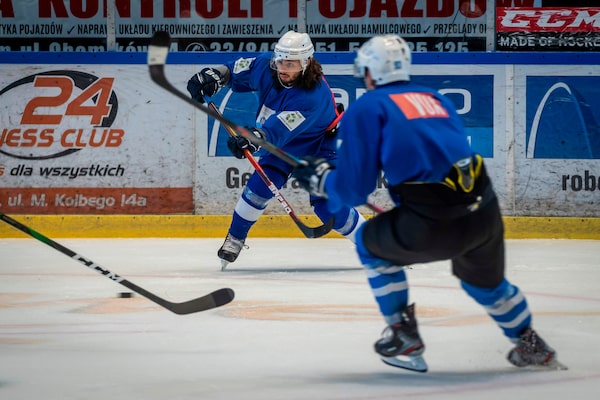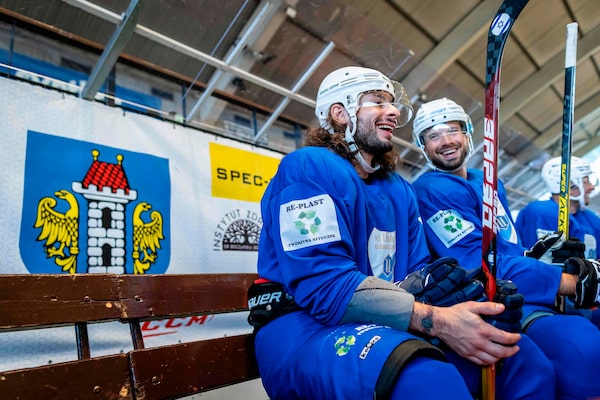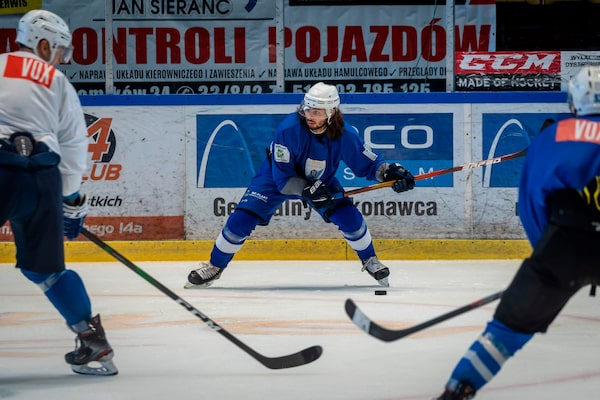
Israel's ice hockey team captain Eliezer Sherbatov after a training session with his ice hockey team Unia Oswiecim, in Oswiecim, Poland, on Aug. 14, 2020.WOJTEK RADWANSKI/AFP/Getty Images
Eliezer Sherbatov has played professional hockey in Europe for eight years, and has a long list of accomplishments.
Soon, the Israeli-born Canadian will suit up with Unia, a team in the city of Oswiecim in southern Poland. It’s more than another stop in a career during which he has played in France, Kazakhstan and Slovakia, including the KHL franchise in Bratislava.
For him, it is a pilgrimage. Oswiecim was the site of the Auschwitz death camps during the Second World War.
“I’m very proud of my Jewish heritage,” Sherbatov says by telephone. “I came here to play for the dead, and for their remembrance. I want Jews to see that a Jewish kid came back [in] a city 80 years after so many died.
“That’s why I am here.”
He grew up in Montreal, played three seasons in the QMJHL, and is the captain of Israel’s national team. But this is something far more important to him than anything he could do on the ice.
“I was motivated to sign with the team so I could create a better history for Jews,” Sherbatov says.
A recent announcement that he was about to join the club in Poland’s premier league caused a backlash. A rabbi in Israel lambasted him on social media, and labelled it a treasonous act. Sherbatov understands the consternation – “Almost every Jewish family lost someone here” – but defended the decision in a response on Twitter.
“I didn’t sign to be a tourist, but to show the world that Jews are stronger than ever,” Sherbatov wrote on Twitter. “If you can’t see that this is bigger than me and you, I am disappointed.”

Sherbatov attends a training session with Unia, in Oswiecim on Aug. 14, 2020.WOJTEK RADWANSKI/AFP/Getty Images
In July, the 28-year-old boarded a flight in Montreal and travelled to Poland via a connection in Paris. He wore a facial covering for more than 10 hours before landing in Krakow, 66 kilometres west of Oswiecim.
He had been to Poland only once before, a five-hour stop in Warsaw for a connecting flight. During the layover, he walked to a synagogue.
“I prayed with the rabbi,” Sherbatov says.
The Sherbatovs were poor, there were language barriers
Eliezer Sherbatov was a toddler in 1992 when he came to Quebec with his mother, father and two older brothers. His parents are Russian and first immigrated to Israel, where Eliezer was born the year before.
His father, Alexei, had been an engineer in Moscow, but could not find a job in his profession in Montreal. To support the family, he worked in a pizza restaurant and repaired refrigerators.
The Sherbatovs were poor, there were language barriers, and they shared a small, cramped apartment in Lasalle.
“I slept in a cigarette box because we did not have any money,” Eliezer Sherbatov says, only partially joking. “It was about the size of a big carton of Marlboros.”
That the family landed in Montreal was a bit of an accident. Alexei was a hockey fan and watched games between the Soviet national team and Team Canada with great interest. He came to admire Guy Lafleur of the Canadiens, so when he filled out immigration documents, not knowing much else, he cited a preference to move to Lafleur’s home province.

Sherbatov was a toddler in 1992 when he came to Quebec with his mother, father and two older brothers.WOJTEK RADWANSKI/AFP/Getty Images
At an immigration interview, Alexei was asked why he wanted to come to Canada, and specifically, why he chose Quebec and Montreal.
“I told the officer, ‘To tell you the truth, I want one of my boys to play hockey like Guy Lafleur,’” Alexei says. “After he heard that, he told me I had passed my interview. He didn’t ask another question.”
Alexei put Eliezer in hockey when he was 6, and he was lousy.
“I was so bad my father wanted me to stop,” Eliezer says.
His mother, Anna, a figure skating champion in Russia, started to work with Eliezer.
“The next year I was faster than everybody else,” he says. “People were asking, ‘How did this happen?’”
At 13, he was invited to play for Israel’s national team at the under-18 world championships in Sofia, Bulgaria. Despite his age, he accepted the offer.
“When the Star of David calls, you don’t have a second thought,” Sherbatov says.
The team competed in Division III, and was coached by Jean Perron, who led the Montreal Canadiens to a Stanley Cup title in 1986.
“I was scared,” Eliezer says. “I was very small and playing against guys who had beards.”
The youngest player to step onto the ice at an under-18 tournament, Eliezer scored four goals and had five assists in five games as Israel won a bronze medal. It was the country’s first medal in hockey.
“I knew pro hockey was in my grasp,” he says.

He came to admire Guy Lafleur of the Canadiens.WOJTEK RADWANSKI/AFP/Getty Images
A leg injury at 14 left him with nerve damage and no sensation below one knee. He continued to play despite the fact that he drags his left foot when he walks and has to wear a brace at all times.
“Basically, I’m physically handicapped,” Sherbatov says.
In 2008, he attended training camp with the Montreal Juniors of the QMJHL, and spent the season playing for the Midget AAA Laval-Bourassa Rousseau Sports. He led the team in scoring with 29 goals and 61 points in 45 games, and helped it win the Quebec Midget AAA championship by scoring 15 goals in 18 playoff games.
A left wing, Sherbatov played for the Montreal Juniors and Baie-Comeau Drakkar for the next three years, and then embarked on a professional career in Europe while also continuing to play for Israel’s national team.
Last year, he led Israel’s national team to its first gold medal at the International Ice Hockey Federation world championship Division II Group B tournament in Mexico City.
The leg injury likely prevented him from an NHL career, but he is satisfied with his accomplishments.
“I’m just glad I could play professionally,” Sherbatov says, who is 5 foot 8 and 190 pounds. “It was my dream to be the first Israeli-born player in the KHL. It is very surreal.”
There was one more thing for him to do.
‘You never think such a thing could happen'
During a ceremony on June 14, Poland’s president, Andrzej Duda, laid a wreath on the railway tracks at Auschwitz where the first train carrying prisoners had stopped 80 years ago.
More than one million men, women and children died at the largest of all Nazi concentration camps and extermination centres between 1940 and October of 1944. Nine tenths of them were Jewish.
“As Jews, we [grieve] a lot because of the Holocaust,” Eliezer Sherbatov says. “You never think such a thing could happen. We think about the sadness and the death, and it’s hard.”

A leg injury at 14 left Sherbatov with nerve damage and no sensation below one knee. He continued to play despite the fact that he drags his left foot when he walks and has to wear a brace at all times.WOJTEK RADWANSKI/AFP/Getty Images
He has been in Oswiecim for three weeks, and his arrival was hailed by the city’s mayor and Poland’s Professional Players’ Hockey Association.
“Welcome, Eli Sherbatov,” the players’ message posted on Twitter said. “We know how sensitive and symbolic it will be for you to play in Oswiecim. The place so important for your fellow countrymen, for us and for the world. We will do all for you to feel welcome. And so will everybody in Oswiecim and beyond.”
Sherbatov has been busy training for the start of the season on Sept. 13, and has conducted numerous interviews. He has not yet visited the museum or taken a tour of Auschwitz.
“I feel it is an honour for me to talk about it, but I am overwhelmed right now,” he says. “I don’t think I have the mental strength and physical strength to go yet. When I am there, I want to be able to absorb the atmosphere and the spirit.”
Some of his father’s relatives died at a different concentration camp.
“When Eliezer called and told us about the contract offer, it was such a huge moment,” Alexei Sherbatov says. “I told him to work hard, to show his lion’s heart, and to be proud of Israel and show people we are still alive.
“It’s not just a win or a game. I think God gave him something to fulfill.”
 Marty Klinkenberg
Marty Klinkenberg